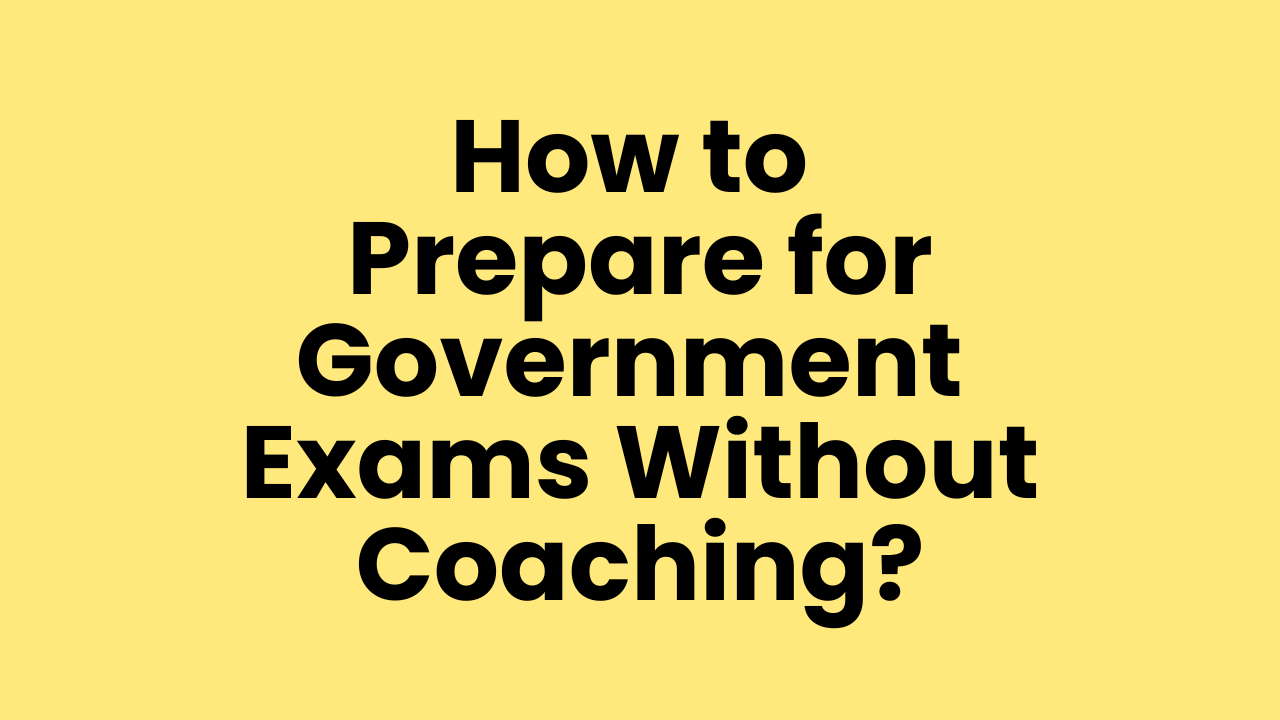Government exams in India, such as UPSC, SSC, IBPS, and state-level exams, are highly competitive. Many aspirants rely on coaching institutes, but self-study can be just as effective if approached strategically. This guide will walk you through a step-by-step plan to prepare for government exams without coaching.
Why Choose Self-Study for Government Exams?
- Cost-Effective: Coaching centers can be expensive, while self-study saves money.
- Flexibility: You can plan your schedule based on your strengths and weaknesses.
- Customized Learning: You can focus on topics that need more attention.
Step 1: Understand the Exam Pattern and Syllabus
Before starting preparation, it is crucial to understand the exam pattern and syllabus. Each government exam has a different structure, but most follow a general pattern:
Key Sections in Government Exams
- General Awareness
- Quantitative Aptitude
- Logical Reasoning
- English Language
- Current Affairs
- Subject-Specific Topics (For Specialized Exams)
How to Get the Syllabus?
- Visit the official website of the exam conducting body.
- Download the latest syllabus PDF.
- Analyze previous years’ papers to understand weightage.
Step 2: Create a Realistic Study Plan
A well-structured study plan is key to success. Follow this approach:
Daily Study Schedule Example
Time Slot | Activity |
|---|---|
6:00 AM – 7:00 AM | Newspaper Reading (Current Affairs) |
7:00 AM – 9:00 AM | Quantitative Aptitude Practice |
10:00 AM – 12:00 PM | Logical Reasoning Exercises |
2:00 PM – 4:00 PM | Subject-Specific Study |
5:00 PM – 6:00 PM | Revision & Notes Making |
7:00 PM – 8:00 PM | Mock Tests & Analysis |
- Stick to consistent study hours.
- Allocate more time to weak subjects.
- Ensure daily revision.
Step 3: Choose the Right Study Material
Selecting the right books and resources is essential.
Best Books for Government Exam Preparation
Subject | Recommended Books |
General Awareness | Lucent’s GK, NCERT Books |
Quantitative Aptitude | R.S. Aggarwal, Arun Sharma |
Logical Reasoning | R.S. Aggarwal, MK Pandey |
English Language | Wren & Martin, Word Power Made Easy |
Current Affairs | The Hindu, PIB, Monthly Magazines |
- Use NCERT books for basics.
- Follow official websites and government portals for updates.
- Watch YouTube lectures for difficult topics.
Step 4: Practice with Mock Tests and Previous Papers
- Solve previous years’ papers to understand the exam pattern.
- Take online mock tests regularly to evaluate progress.
- Analyze mistakes and work on weak areas.
- Join free online test series offered by reputed websites.
Step 5: Improve Time Management and Accuracy
- Learn shortcuts for quantitative aptitude.
- Practice reading comprehension techniques.
- Solve one mock test daily in the final preparation phase.
Step 6: Stay Updated with Current Affairs
- Read The Hindu, Indian Express, and PIB reports.
- Follow monthly current affairs magazines.
- Watch YouTube channels that provide daily updates.
- Make short notes and revise weekly.
Step 7: Make Effective Notes
- Use mind maps and flowcharts.
- Keep separate notebooks for each subject.
- Highlight important facts and formulas.
- Revise notes daily.
Step 8: Maintain a Healthy Routine
- Follow a proper sleep schedule.
- Take short breaks between study sessions.
- Engage in light exercise or meditation.
- Stay motivated and avoid distractions.
Common Mistakes to Avoid
- Ignoring previous year question papers.
- Studying without a structured plan.
- Not focusing on revision.
- Relying on too many study materials.
- Ignoring mock tests and time management.
Our Recommendation
Preparing for government exams without coaching is challenging but achievable with the right strategy. Focus on self-discipline, quality resources, and consistent practice. Stay motivated, manage your time effectively, and believe in your abilities. With determination and effort, you can clear your desired government exam and achieve success!
Frequently Asked Questions
Yes, many aspirants have successfully cleared government exams with self-study by following a disciplined approach and using the right resources.
Ideally, 6-8 hours of dedicated study is recommended. However, consistency matters more than the number of hours.
Websites like Testbook, Gradeup, and Adda247 offer quality free and paid mock tests.
Regular practice, time-based mock tests, and learning shortcut methods can improve speed and accuracy.
NCERTs, Laxmikant for Polity, Spectrum for History, and Ramesh Singh for Economy are some of the best books.
Set small goals, take breaks, stay connected with fellow aspirants, and remind yourself of the long-term benefits.
Online courses can be helpful, but they are not mandatory. Free YouTube channels and government websites provide great resources.
Read newspapers daily, follow monthly current affairs compilations, and watch news analysis videos.
Attempt at least 20-30 full-length mock tests to develop confidence and improve time management.
Yes, neat and legible handwriting, along with well-structured answers, can fetch you better marks.

With years of experience in career guidance, online income strategies, and skill development, Aman shares practical insights on CareerKendra.com, a platform designed to empower professionals, students, and freelancers with valuable knowledge.

